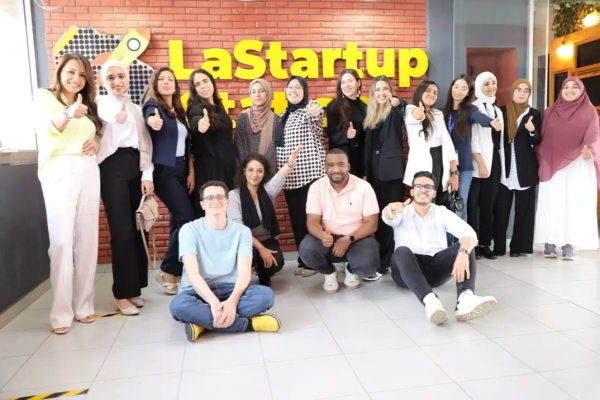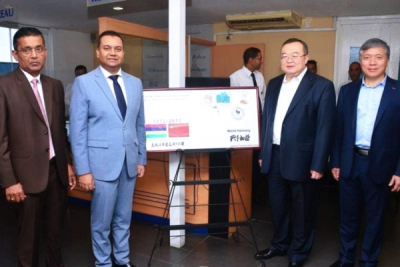La Startup Station, an accelerator for tech startups based in Morocco, plays a crucial role in developing innovation and entrepreneurship in the country. By fostering collaboration between startups and large companies, it creates opportunities for local entrepreneurs and startups.
Founded in 2017 as La Startup Factory, La Startup Station promotes the startup mindset within large public and private institutions to democratize the culture of technological innovation and entrepreneurship. The accelerator is led by its founder, Mehdi Alaoui, who sets up various programs to support innovation and digital transformation. It offers a tailored acceleration plan for startups, regardless of their development stage (ideation, prototyping, or launch).
The tech hub helps budding entrepreneurs test their idea’s viability and make it fruitful. For those who already own a business, it assists in structuring market access, validating their proof of concept, setting up the minimum viable product (MVP), and finding financing.
La Startup Station also helps entrepreneurs develop their businesses and scale up by implementing a growth strategy that includes access to suitable financing solutions.
In addition to its acceleration programs, it has also set up La Startup School, a fully digital and free program that includes workshops, expert interventions, entrepreneurs and entrepreneurship trainers, as well as advice and best practices.
The accelerator also organizes several events, like the Global Industry 4.0 Conference on July 26, 2023. The event aims to bring together companies and actors working in the field of artificial intelligence, the Internet of Things (IoT), big data, robotics, and automation.
So far, La Startup Station has supported 5,000 established startups and financed 65 startups. Thanks to its investor partners, 14 startups have already completed at least one fundraising round. The accelerator has launched more than 50 open innovation programs with large companies, raised awareness about innovation and collaboration with startups among over 100,000 employees, managers, and senior executives, and enabled the deployment of over 29 innovative digital solutions within companies.
La Startup Station’s partners include Facebook, Sanofi, Société Générale, the World Bank, GIZ, BNP Paribas, Leoni, LafargeHolcim, Bymaro, Vinci Energies, and BMCE Capital.
Melchior Koba
On its path to digital sovereignty, Senegal’s government wants to address the country's priorities relative to sustainable development, innovation, and value creation.
Senegal will soon have a National Data Strategy. Earlier this week, Moussa Bocar Thiam, the minister of telecom and digital economy, unveiled progress made in the strategy’s development, ahead of its implementation.
"We all know that data is essential in today's digital economy. It is important that Senegal, as one of the pioneering countries in this field, establishes a strategy for data governance and data valorization, to see how this data can be processed in the country, and how its use should be regulated," said Thiam.
Back on March 23rd, 2023, the same official kicked off works to draw the National Data Strategy. The project is supported by Germany, the European Union (EU), and Smart Africa. It meets a need to provide users with a document governing the security and integrity of data during their use. The goal is to make data a driver of socio-economic growth, inclusivity, innovation, and international openness in Senegal by 2028.
The upcoming strategy is based on fundamental principles such as privacy protection, transparency, and fairness. It also takes into account the regulatory framework, data collection infrastructures (like data centers), and data preservation and exploitation.
According to Moussa Thiam, implementing the strategy will foster responsible data use, better privacy protection, and promote innovation - all things which should, ultimately, contribute to a flourishing digital future for Senegal.
Samira Njoya
Seven years ago, Cape Verde started building a technological center with research and high-level training centers, but also cutting-edge industries. The country expects the project to be completed next year.
Cape Verde just received a second loan, of €14 million, from the African Development Bank (AfDB) for its TechPark project. The Bank and the country recently signed the related agreement in Praia, Cape Verde's capital. The AfDB disclosed the signing on July 26.
Carlos Monteiro, who heads TechPark's board of directors, said the money will be used to equip the park's two data centers and other areas. Parts will also be used to get furniture, set up renewable energy parks, develop green spaces, and train people who will work at the park.
"The next generation of African talent doesn't need to look for opportunities abroad; Cape Verde has the necessary infrastructure and a favorable political system to nourish their dreams and ambitions in their own country," said Abdu Mukhtar, the AfDB's director for industrial and trade development.
The AfDB's financing falls under its support strategy for major digital projects in Africa. The facility is the second loan provided for building the TechPark site. The project benefited from a first loan of €31.59 million. The funds support Cape Verde's ambitions to become a digital hub, with a dynamic economy.
The new loan will speed up the park's construction. At full capacity, the park, which should be operational in 2024, will create 1,014 new jobs directly linked to its activities. Another 1,217 indirect jobs will also be created. It is expected to generate an average of €7.5 million per year in its first five years of operation.
Samira Njoya
Many graduates end up without a job or with underpaid jobs. To tackle this issue, Ayman Bazaraa launched Sprints to guarantee that youths have decent jobs. He gives them personalized training.
Ayman Bazaraa is the co-founder and CEO of Sprints, an ed-tech company. The Egyptian studied at the University of Cairo where he obtained a Bachelor in Electronics and Communication in 2004. In 2014, he studied Leadership, Finance, and Management at the European Centre for Executive Development.
Sprints was founded in 2019 to unlock the potential of 100 million curious learners and help them develop essential skills in the AI era. The ed-tech company assesses the youth who register for its courses and offers a personalized learning path.
Once they have reached the end of the path, the startup guarantees a well-paid job in big tech companies, in Egypt and around the world. It also supports its students’ careers. With Sprints, Bazaraa was picked among the 50 finalists of Africa’s Business Heroes 2023. He also won the final qualifiers of the "El Forsa with Lamees El Hadidi" television competition for startups.
Before Sprints, Ayman Bazaraa co-founded MicroDoers in 2012, a company that provides innovative augmented reality solutions to a broad base of clients in the United States, Europe, and Asia. In 2015, he also co-founded Avelabs, a provider of integrated solutions and services for the automotive industry.
Before his entrepreneurial years, Bazaraa worked for Orange Egypt as a software engineer starting in December 2004. He joined IBM in 2005, initially as an embedded software designer, then as a team leader of over 20 software engineers. In 2011, he became the director of automotive supplier Valeo in Egypt and founded the department of software experts that now supports all the company's projects worldwide.
Melchior Koba
Africa must match its youth education to the needs of the future digital world. According to the World Bank, this shift is crucial and it will help integrate millions of people into the workforce. In several countries, there is a push toward the development of more web, digital, and computer science-focused curricula.
Ynov Campus, a Moroccan computer engineering school, has partnered with Cisco, the US tech giant. Under the agreement they both recently signed, Cisco will help bolster digital skills in Morocco.
The partnership, according to Ynov Campus’s CEO, Amine Zniber (photo, left), will offer the school’s students many opportunities.
"As one of the world's leading information and communication technology companies, Cisco plays a crucial role in digital and technological transformation on a global scale. Thanks to this partnership, Ynov Campus students will now have access to world-class training resources, internationally recognized certifications, and internship and job opportunities within Cisco's global network," Zniber told a local media outlet.
The signing reinforces the partners’ commitment to education, innovation, and youth employability in Morocco. Besides benefits for students, the deal will also provide opportunities for joint research and development as well as collaborations on innovative technological projects.
The goal is to provide young people with the necessary skills to succeed in a constantly evolving digital economy and contribute to Africa’s development. According to the World Bank, the continent will account for a third of the world's young population by 2050.
Samira Njoya
Spurred by Covid and digital transformation, the postal sector has morphed in a very short period, especially looking at e-commerce’s rapid growth. To ride this tide, African countries decided to update their post systems.
China will support the digital transformation of Mauritius’ post company, Mauritius Post. A group of Chinese experts was in the African country earlier this week, July 24th, in this framework.
China, according to the Mauritian Minister of ICT and Innovation, Darsanand Balgobin, will provide in-depth training to post office staff, equipping them with the knowledge and skills they will need to implement, locally, everything they will be taught.
The Asian giant will also provide its technical expertise for the digitization of key postal activities to improve the postal services offered to the population.
The collaboration aligns with Mauritius Post’s new vision, which involves introducing digital technology into its main activities and revitalizing itself through the e-post project.
To this end, the Mauritian government has sought the expertise of several countries to help improve local postal services. The government, among others, wants parcel delivery to be faster and make postal services more efficient, by introducing digital claim services, parcel tracking, and online payments.
Many African countries, like Mauritius, are taking steps to digitize their postal services to boost postal activity, and e-commerce, and attract big sales companies. Examples of such countries include Senegal, Congo, South Africa, and Djibouti.
Samira Njoya
In 1994, Eastern and Southern African countries formed a common market, offering numerous facilities to national actors. However, various non-tariff barriers, financial barriers particularly, threaten the commercial inclusion sought.
The Common Market for Eastern and Southern Africa (COMESA) will launch a digital payment platform by June 2024, COMESA Business Council (CBC) CEO Teddy Soobramanien (photo) announced at a press conference in Lusaka (Zambia) last Monday.
The platform aims to facilitate online transactions and boost trade relations between countries in the region. "The project will be launched in eight countries before being rolled out to all 21 member states by June next year [...] Financial inclusion ecosystems are key to sustainable development and economic progress, particularly among small and medium-sized enterprises (SMEs), which drive innovation, job creation, and poverty reduction," said Teddy Soobramanien.
"By harnessing the power of digital technology, we can unlock the unprecedented opportunities for them, empowering them to realize their full potential and contribute to the region’s prosperity," he added.
The implementation of the digital payment platform is part of a COMESA project aimed at improving the digital financial inclusion of micro, small, and medium-sized enterprises (MSMEs) in the region. The project focuses on improving financial regulation and reducing cross-border transaction costs for MSMEs in the concerned markets.
Once deployed, the platform will not only stimulate economic growth and financially empower the most vulnerable social categories but, it will also promote partnerships between businesses in the region.
Samira Njoya
The computer scientist uses programming tools to find lasting solutions that will help his community and country as a whole.
Umar Bolokada Mansaray is a Sierra Leonean entrepreneur and self-taught computer scientist with expertise in front-end, mobile development, and UI/UX design. He co-founded Smart H2O in 2022.
Smart H2O aims to revolutionize water purification using computer programming tools. With his startup, Bolokada won the Community Mining Innovation Challenge the same year.
Umar Bolokada grew up in eastern Sierra Leone, a mining region with abundant natural resources. However, due to mining activities, the region was plagued with significant water pollution, and consequently, people in the area had low access to clean and safe drinking water. Bolokada, therefore, felt a deep responsibility to solve this problem and help his people.
Smart H2O works on building an advanced system using Arduino (an open-source electronic prototyping platform) and the Internet of Things (IoT) to detect and purify polluted water. By employing cutting-edge technology, the system can rapidly analyze water samples, identify contaminants, and apply appropriate purification methods. This process proves to be more efficient, cost-effective, and eco-friendly compared to conventional purification techniques.
The turning point in Bolokada's journey came in late 2022 when he “was introduced to the Orange Fab lab through a supportive friend and mentor.” This incubation by Orange Fab proved to be a game-changer, “providing vital resources, mentorship, and access to a wide network of experts and investors,” he revealed. This support accelerated Smart H2O's development, enabling Bolokada and his team to refine their algorithms, conduct real-world tests, and expand their research in regions facing water contamination challenges.
Though at its infancy stage currently, Bolokada “aims to reach many communities and expand beyond Sierra Leone in the coming years.”
Before founding Smart H2O, Bolokada had launched another startup called Kam Rent Ya in 2020, which aimed to simplify the rental process for housing seekers. Available on the web and mobile, the solution helps users find and rent properties remotely.
Beyond his entrepreneurial ventures, Bolokada worked as a UI engineer for Women Power Africa, an organization advocating for gender equality, in 2020. The following year, he founded Her Choice, a non-profit organization dedicated to empowering women and girls. Umar Bolokada Mansaray exhibits genuine leadership and innovation, poised to drive substantial transformation in the domains he operates within.
Hikmatu Bilali
Andrew Takyi-Appiah has worked in the world of finance for more than 15 years. He has expertise in the field of banking and mobile payments. The company he heads strives to improve financial inclusion in Africa.
Andrew Takyi-Appiah is a Ghanaian entrepreneur and business leader who obtained a bachelor's degree in Business Administration from the University of Hull in 2002. He also holds a postgraduate degree in Management obtained in 2005 at UCLA. In 2021, he obtained the same degree in fintech at Saïd Business School, University of Oxford. Talyi-Appiah is the Co-founder and Managing Director of Zeepay.
Founded in 2016, Zeepay is a fintech startup that aims to improve financial inclusion and make the world a better place to live. Leveraging partnerships with money transfer operators, the startup allows international fund transfers and ATM cash withdrawals.
Also, it allows holders of prepaid or debit VISA cards to receive money directly onto their cards within minutes. Zeepay has already conducted over 1,000,000 transactions across 23 countries in Europe, North America, and Africa and will soon be launched in Côte d'Ivoire.
In March 2023, Andrew Takyi-Appiah received the Fintech Leader of the Year in Africa award at the CEO Summit for the second consecutive time, highlighting his critical role in the growth and advancement of sub-Saharan Africa's economic landscape. More recently, he was selected among the 50 finalists of Africa’s Business Heroes.
"At Zeepay, we are ready to provide our support and advice and invest in any innovative fintech idea that has a lot of potential and aims to benefit the ordinary African. Zeepay is for Africa, and we look forward to growing with Africa. We will continue to harness African human resources and innovations to drive growth," said the entrepreneur in 2022.
Before launching Zeepay, he worked in several financial institutions like GTBank, where he was in charge of corporate banking in 2007, and Ecobank Transnational Incorporated from 2007 to 2011. Between 2011 and 2013, he worked at PwC, and between 2013 and 2016, he was at UT Bank Ghana.
Melchior Koba
The digital economy should represent 8.5% of Africa's GDP–or $712 billion–by 2050. This is a promising sector and that is why many African countries have been launching digital transformation projects in recent years.
The Ivorian government allied with US cybersecurity firm Cybastion last Tuesday, July 18. Under the partnership, Cybastion will help reinforce Côte d’Ivoire’s IT facilities and anticipate cyber threats. The company will also help boost locals’ IT skills and train highly qualified professionals who will contribute to the African nation’s digitization in the long term.
The partnership agreements were inked by the ministers of ICT, Transport, and Trade of Côte d’Ivoire, and Cybastion.
Besides these agreements, the minister of ICT, Amadou Coulibaly, also signed with his counterpart from Public Service, Anne Désirée Ouloto, a partnership agreement on the same day with the National Company for the Publication of Administrative Documents and Identification (SNEDAI) and SAH Analytics International group. This agreement is aimed at digitizing and modernizing administrative procedures, especially by setting up a biometric identification system that will cover the country's public administrations.
According to Anne Désirée Ouloto, this partnership will reduce the absenteeism of state workers, and monitor attendance at work. And this should, according to her, bolster transparency and equity in the public sector.
The various partnerships are part of Côte d’Ivoire’s 2021-2025 National Strategy for the Development of the Digital Sector. This is a strategy that features several digitization projects, which align with President Ouattara’s vision to modernize and reinforce Ivorian public services.
Samira Njoya
More...
The Zambian government aims to pursue a digital path and enhance trade partnerships, emphasizing the need for preparedness in services and cross-border interactions.
A delegation from Zambia's digital economy sector arrived in Nigeria, on July 10, to study the country's digital economy model through a visit of the National Information Technology Development Agency (NITDA).
Led by Austin Sichinga, a director from the Zambia Information and Communication Technology Authority (ZICTA), the delegation aims to learn from Nigeria's successful approach and adapt it to their digital transformation efforts.
“NITDA has leapfrogged most African institutions that are into technology development in the continent. We have seen and acknowledged its development efforts in supporting ICT start-ups, and imparting relevant ICT skills on young minds,” Mr. Sichinga said.
During the visit, the Zambian team will study “Nigeria’s IT regulatory instruments, policy implementation, Public Key Infrastructure, and cyber security, and explore NITDA’s relationship with government agencies and stakeholders in the digital economy sector,” NITDA explains on Twitter.
NITDA's Director General, Kashifu Inuwa, commended the Zambian government's initiative to study the Nigerian model, highlighting the importance of collaboration among African nations to develop effective digital strategies. “We need to work as a team, so as Africans, I think this is high time for us to come together; come up with our digital strategy because digital is beyond boundaries, it is borderless,” he said.
The Zambian delegation's visit to NITDA follows visits from Ghana, Gambia, and Kenya, reflecting the agency's reputation for driving technological development. NITDA plans to share its expertise through a playbook to promote a strong digital economy across Africa.
NITDA is a government body that implements Nigeria's IT policy and coordinates IT development. The agency's initiatives, such as the National Centre for Artificial Intelligence and Robotics (NCAIR) and the Office for Nigerian Digital Innovation (ONDI), support startups and contribute to job creation and economic growth.
Hikmatu Bilali
Although digital advancements present opportunities for growth and development, they also unfortunately provide a platform for criminals to exploit, undermining their positive potential.
In Ghana, 422 individuals involved in illegal digital lending were arrested in a joint operation recently carried out by the Cyber Security Authority (CSA), the Bank of Ghana (BoG), and the Economic Organised Crime Office (EOCO). They are accused of cyberbullying, extortion, and abuse of customer data. The operation was carried out across three locations in the Greater Accra Region on July 10.
The arrests were made in the framework of a joint investigation, part of the Joint Cybersecurity Committee (JCC) activities, which resulted in the apprehension of 419 Ghanaians, one Chinese, one Pakistani, and one Indian suspect. Seized items included 654 mobile phones, 22 laptops, and 800 SIM cards.
At a press conference, the three agencies involved in the operation indicated that the joint investigation aims to enforce relevant cybersecurity, banking, and crime prevention laws.
The CSA had received over 270 reports of cyberbullying, extortion, and other illicit activities since December 2022. Following their investigations, the Cybersecurity authority identified and shared findings on 150 unlicensed applications involved in illegal practices.
EOCO, responsible for safeguarding financial market integrity, formed a joint technical task force with BoG and CSA to target unlicensed digital loan platforms. COP Maame Yaa Tiwaa Addo-Danquah (Executive Director of EOCO) warned the public against engaging with illegal financial entities online, affirming EOCO’s commitment to enforcing financial market regulations.
The collaborative effort is a significant stride in Ghana's fight against cybercrime and aims to protect citizens from fraudulent lending practices. By fostering a secure digital environment and upholding financial market integrity, authorities are working to safeguard the public's financial well-being.
Hikmatu Bilali
In Africa, more e-mobility apps are emerging. They are appealing both to locals and tourists, mostly because they are safer and more transparent than traditional taxis.
Developed by a Moroccan startup, VotreChauffeur.ma is a digital platform that lets its users book luxury cars with a driver. The Casablanca-based startup was founded in 2014 by Jawad Ziyat and Ismael Belkhayat.
The platform can be accessed on computers but also on Android and iOS devices. On mobile devices, the user needs to register on the App after downloading it. Taxis booked via the platform can be used for intra-city trips, excursions, tourist circuits, or airport transfers. Drivers can also be booked for a given duration.
"The only criterion we take into consideration is whether you want to keep the car with its driver in Casablanca, or outside this city. From that point on, you are free to make all the trips you need, all services are included in the price announced at the time of your reservation," the startup indicates.
The user also has a choice of the type of car. VotreChauffeur.ma has sedans and vans and the type of car affects the rates. Wifi, phone charger, bottled water, newspapers, and magazines are all services available on board the startup's vehicles.
"Prices depend on the option chosen and the city you are located. Our rates are primarily calculated based on the reserved route and the distance of the driver from your starting point," the platform notes. It is possible to view from the web platform and the application the list of available drivers in real-time.
In addition to Casablanca, VotreChauffeur.ma is present in Agadir, Marrakech, Rabat, Fès, and Tangier. On Google Store (Android), the App already totals over 10,000 downloads.
Adoni Conrad Quenum
Benin, like most African countries, considers the digital economy as an important component of its development. One of the actors advancing technological innovation in the country is EtriLabs hub.
EtriLabs is both an innovation ecosystem and a community of individuals keen to co-create and collaborate on projects aimed at solving major problems at the national and international levels.
Founded in 2009 by Senam Beheton, its CEO, Etrilabs’s vision is to foster an entrepreneurial culture focused on innovation, creativity, and sharing, by creating an environment conducive to the emergence of world-class solutions.
Like most innovation centers, EtriLabs offers a well-equipped co-working space for entrepreneurs, designers, developers, and marketing specialists.
The hub is based in Benin and Senegal. In the former, it has two centers in Cotonou (South) and one in Parakou (North). In the latter, it has one center in Dakar, the capital. Its three areas of intervention are ecosystem development, enterprise acceleration and incubation, and digital innovation. As part of ecosystem development, it provides several digital training programs, such as the Learn2Code camp which trains children in computer programming and graphics.
With EtriStars, which regroups all its acceleration programs, EtriLabs meets the needs of young companies and helps them overcome the challenges they face by providing them with support and access to essential resources.
EtriLabs also offers tailored solutions to businesses, individuals, non-governmental organizations, and governments. Whether it's developing a brand image, introducing an innovation strategy within the institution, or integrating new digital technologies, the center helps its trainees achieve their goals.
Besides training programs, EtriLabs offers workshops and seminars on various topics. It also organizes events to promote networking, product and service demonstrations, and fundraising.
With the help of its partners, EtriLabs has supported more than 1,000 entrepreneurs in 14 sectors of activity. Among the companies it has supported are fintech FedaPay, Ylomi which connects artisans with potential clients, and healthtech Rema.
Melchior Koba















